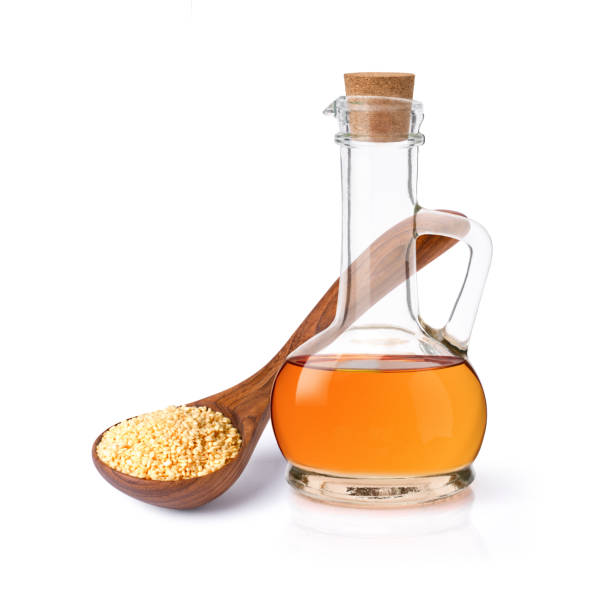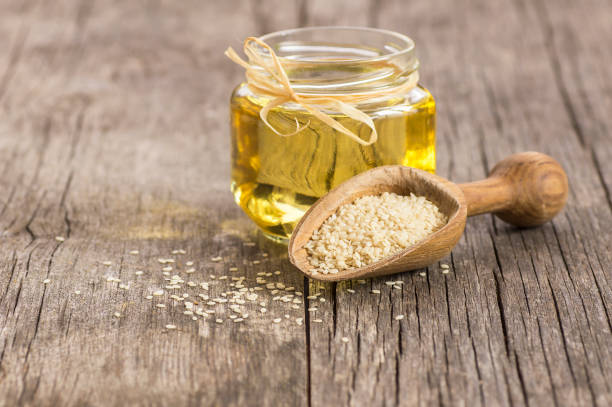What to Eat and Drink
What’s the Difference? Sesame Oil vs. Sesame Seed Oil
Is sesame oil and sesame seed oil interchangeable? This typical question often causes confusion in the kitchen. Both oils are sourced from sesame seeds, however there are significant distinctions between them.
Differences between Sesame Oil and Sesame Seed Oil
Sesame oil and sesame seed oil may appear identical, but their production processes and flavors differ. Sesame oil is prepared by toasting sesame seeds, which gives it a rich, nutty flavor and a deeper color. The toasting procedure improves the scent and flavor of the oil, making it a popular ingredient in Asian cuisine. Sesame seed oil, on the other hand, is prepared from raw, unroasted seeds, which gives it a lighter flavor and color. It’s commonly used in dressings, marinades, and as a finishing oil.
The various processing methods give each oil a particular flavor signature. Sesame oil has a rich, earthy flavor that can enhance savory meals. It is frequently used in stir-fries, sauces, and as a flavoring in Asian dishes. Sesame seed oil, on the other hand, has a gentler, more delicate flavor that works well in dressings, vinaigrettes, and light dishes where the flavors need to be enhanced without being overpowering.
While both oils can lend a distinct flavor to your culinary creations, it is critical to select the appropriate one based on your recipe or intended flavor profile. Understanding the properties and applications of each oil can help you make an informed culinary decision.

Nutritional Value of Sesame Oil and Sesame Seed Oil
In addition to their different flavors, they provide a variety of health benefits. Both oils contain good fats, vitamins, and minerals, which promote general health.
Sesame oil contains monounsaturated and polyunsaturated fats, both of which are thought to be beneficial to the heart. These fats may help lower bad cholesterol and lower the risk of heart disease. Sesame oil also includes vitamin E, which is an antioxidant that protects cells from free radicals. It also includes trace levels of vitamin K, which is necessary for blood clotting.
On the other hand, sesame seed oil includes a higher quantity of omega-6 fatty acids, which are necessary for the body but should be used in moderation. Omega-6 fatty acids are important for brain function and growth, but an imbalance between omega-6 and omega-3 fatty acids can contribute to inflammation in the body.
Both oils include trace amounts of additional vitamins and minerals, such as calcium, iron, and magnesium. However, the nutritional value of the oils varies depending on the brand and processing processes.
Health Benefits of Sesame Oil and Sesame Seed Oil
Aside from their nutritional worth, sesame oil and sesame seed oil have a variety of health benefits. These oils have been used in traditional medicine for ages and are thought to provide a variety of medicinal benefits.
Sesame oil contains antibacterial and anti-inflammatory qualities that can protect the skin and improve wound healing. It is commonly used in Ayurvedic medicine to treat skin disorders like eczema and psoriasis. Sesame oil is also a natural source of antioxidants, which can help lower oxidative stress and prevent chronic diseases.
Sesame seed oil is recognized to have anti-cancer effects. It contains lignans, a phytoestrogen that has been found to slow the growth of cancer cells. According to several research, it may help lower the incidence of malignancies such as breast, colon, and lung. However, further research is required to completely comprehend the significance in cancer prevention.
While these health advantages appear promising, it is crucial to remember that these oils should be eaten in moderation as part of a well-balanced diet.

Culinary Uses of Sesame Oil and Sesame Seed Oil
These oils are versatile ingredients that can enhance the flavor of a variety of foods. Their distinct flavors and smells make them a popular ingredient in many cuisines throughout the world.
Sesame oil is widely used in Asian cuisine, particularly Chinese, Japanese, and Korean foods. Its robust, nutty flavor enriches stir-fries, noodles, and marinades. It can also be used as a finishing oil, drizzled over cooked meals to add taste. Toasted sesame oil is particularly praised for its strong scent and flavor.
Sesame seed oil, with its milder flavor, is commonly used in dressings, vinaigrettes, and sauces. Its mild, nutty flavor goes nicely with salads, grilled vegetables, and shellfish. Sesame seed oil can also be used to replace other oils in baking recipes, adding a delicate nutty flavor.
When cooking with these oils, use it carefully because the flavors can easily overshadow a meal. Start with a tiny amount and adjust based on your taste preferences.
How to Choose the Right Type of Oil for Your Cooking Needs
Your recipe and desired flavor profile will determine whether you use sesame oil or sesame seed oil. When determining which oil to use, consider the following factors:
- Flavor: If you’re looking for a strong, nutty flavor, opt for sesame oil. For a milder, more delicate taste, choose sesame seed oil.
- Cooking method: Sesame oil has a higher smoke point, making it more suitable for high-heat cooking methods like stir-frying. Sesame seed oil is best used as a finishing oil or for low-heat cooking.
- Recipe compatibility: Consider the other ingredients in your recipe and how they will complement the flavors of these oils. Experiment with small amounts to find the right balance.
- Personal preference: Ultimately, the choice between these oils comes down to personal preference. Try both oils and see which one you prefer in your cooking.

Popular Brands of Sesame Oil and Sesame Seed Oil
When it comes to choosing sesame oil or sesame seed oil, there are several reputable brands to consider. Here are some popular options:
- Kadoya: Known for its rich flavor and high-quality, Kadoya is a well-established brand in the sesame oil market.
- Lee Kum Kee: A trusted name in Asian condiments, Lee Kum Kee offers a range of sesame oils for various cooking needs.
- La Tourangelle: La Tourangelle is known for its artisanal oils, including high-quality sesame seed oil made from organic seeds.
- Spectrum: Spectrum offers organic sesame oil that is cold-pressed to retain its natural flavors and nutrients.
When selecting a brand, read reviews, check for certifications, and consider your budget and availability.
Tips for Storing and Using Sesame Oil and Sesame Seed Oil
To maintain the quality and flavor of sesame oil and sesame seed oil, it’s important to store them properly. Here are some tips:
- Store in a cool, dark place: Both oils are sensitive to light and heat, so keep them in a cool pantry or cabinet away from direct sunlight and sources of heat.
- Seal tightly: Make sure the bottle is tightly sealed to prevent air and moisture from entering, which can cause the oils to spoil.
- Check for rancidity: Over time, these oils can become rancid. Check the aroma and taste before using, and discard if they smell off or taste bitter.
- Use within the recommended shelf life: While the shelf life can vary depending on the brand, it’s generally recommended to use these oils within a year of opening.
When using any of these oils in your recipes, remember to start with small amounts and adjust to your taste preferences. The oils can be quite potent, so a little goes a long way.
Conclusion
When it comes to these oils, their common origin doesn’t diminish the fact that they offer distinct flavors and uses in the culinary world. I appreciate the rich, nutty taste that sesame oil brings to my Asian dishes, while sesame seed oil provides a milder flavor that works perfectly in dressings and light dishes.
I take into account the specific recipe, my desired flavor profile, and the cooking method involved. Experimenting with both oils has allowed me to discover which one best suits my taste preferences and enhances my culinary creations.
Trusted Health, Wellness, and Medical advice for your well-being


